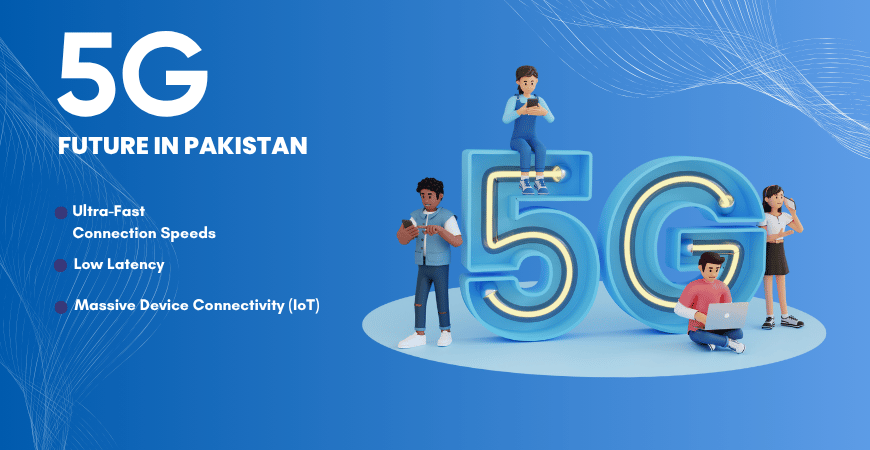Future of 5G in Pakistan – Opportunities & Challenges
Why the Future of 5G in Pakistan Matters
Technology has been reshaping the world at an unprecedented pace, and one of the most transformative advancements of the last decade has been the development of 5G networks. Countries across Asia, Europe, and North America have already begun deploying 5G, bringing faster connectivity and advanced digital opportunities. Pakistan, while slightly behind in adoption, is also preparing for a 5G-driven future.
The future of 5G in Pakistan holds immense potential—not just for faster internet, but for reshaping industries, creating jobs, and driving digital transformation. In this article, we’ll explore where Pakistan currently stands, what opportunities 5G will bring, and the challenges that need to be overcome before it becomes a nationwide reality.
Current Status of 5G in Pakistan
Pakistan introduced 3G and 4G networks later than many other countries, but their adoption rates were impressive once they rolled out. According to the Pakistan Telecommunication Authority (PTA), mobile broadband penetration has grown rapidly in the last decade, with millions of users depending on 4G for communication, education, and entertainment.
When it comes to 5G, Pakistan has conducted several successful trials with telecom operators like Zong and Jazz showcasing ultra-fast speeds and low-latency connectivity. However, full-scale commercial rollout is still pending due to infrastructure costs, spectrum auctions, and regulatory considerations.
Opportunities with 5G in Pakistan
The future of 5G in Pakistan is not just about speed—it’s about possibilities. Here are some of the most promising opportunities:
1. Boosting the Digital Economy
5G will enable Pakistan’s growing IT and freelancing industry to operate more efficiently. With faster upload and download speeds, freelancers, startups, and tech firms can collaborate globally without connectivity barriers.
2. Smart Cities and IoT
Cities like Lahore, Karachi, and Islamabad can leverage 5G for smart city projects. From intelligent traffic management to energy-efficient streetlights and surveillance systems, 5G will enable seamless communication between devices through the Internet of Things (IoT).
3. Healthcare Advancements
Telemedicine can reach new heights with 5G. Imagine doctors in Karachi conducting real-time consultations or even robotic-assisted surgeries for patients in remote areas of Balochistan. High-speed, low-latency networks will make this possible.
4. Education and Remote Learning
COVID-19 showed Pakistan the importance of digital education. With 5G, students in villages and small towns will have access to high-quality video lectures, virtual classrooms, and interactive e-learning without constant buffering.
5. E-Commerce and Digital Banking
Pakistan’s e-commerce sector is booming, and 5G will only accelerate this growth. Faster and more reliable connections will encourage more people to use digital wallets, online shopping platforms, and mobile banking services.
6. Agriculture and Rural Development
With nearly 60% of Pakistan’s population dependent on agriculture, 5G-powered solutions such as smart irrigation, weather prediction, and crop monitoring can help farmers increase productivity and reduce losses.
Challenges in Implementing 5G in Pakistan
While the opportunities are enormous, the road to full 5G adoption in Pakistan comes with several challenges:
1. High Infrastructure Costs
Upgrading the current telecom infrastructure to 5G requires significant investment in fiber optics, base stations, and advanced towers. Telecom operators already face financial pressures due to heavy taxes and spectrum costs.
2. Spectrum Auction Delays
The government needs to release sufficient 5G spectrum at affordable rates. Delays or overpriced auctions can slow down the adoption of 5G across the country.
3. Device Affordability
Most Pakistanis still use 4G smartphones, and many rely on budget-friendly devices. For 5G to succeed, affordable 5G-enabled smartphones need to be available in the market.
4. Energy Shortages
Frequent electricity shortages in Pakistan can impact the reliability of 5G towers and data centers. Without stable power infrastructure, scaling 5G nationwide will be difficult.
5. Digital Divide
Urban centers like Karachi and Lahore may adopt 5G quickly, but rural Pakistan still struggles with 3G and 4G connectivity. Bridging this digital divide is essential to ensure equal benefits for all citizens.
Government and Policy Initiatives
The Government of Pakistan has already taken steps to prepare for 5G. The Ministry of IT and Telecommunication has announced its roadmap for 5G trials and spectrum allocation. The government is also working with global technology providers like Huawei and Ericsson to test infrastructure solutions.
Regulatory frameworks and collaboration between the public and private sectors will be critical for successful deployment. If done right, 5G can become a driver of economic growth and digital transformation.
Global Lessons for Pakistan
Countries like South Korea, China, and the United States have already shown how 5G can transform industries. Pakistan can learn from their experiences:
-
South Korea: Rapid nationwide deployment led to widespread adoption and innovation in gaming, healthcare, and smart cities.
-
China: Leveraged 5G for advanced manufacturing and AI integration.
-
USA: Focused on rural coverage challenges, offering valuable insights for Pakistan’s digital divide.
By studying these models, Pakistan can adopt best practices while avoiding costly mistakes.
Outbound Resource
For more insights on Pakistan’s digital journey and telecom developments, the Pakistan Telecommunication Authority (PTA) provides regular updates on spectrum policies, trials, and mobile broadband growth.
The Road Ahead – Future of 5G in Pakistan
The next few years will be crucial in shaping the future of 5G in Pakistan. With a young population, rising digital literacy, and a booming tech industry, Pakistan is well-positioned to embrace this new era of connectivity.
However, success depends on addressing challenges such as infrastructure investment, device affordability, and equitable access. If tackled effectively, 5G has the potential to:
-
Transform Pakistan’s economy.
-
Empower youth with digital opportunities.
-
Enhance healthcare, education, and agriculture.
-
Place Pakistan on the global map as a competitive digital economy.
Conclusion
The future of 5G in Pakistan is filled with possibilities that go far beyond faster internet. It’s about building smarter cities, improving lives, and unlocking economic growth. Pakistan may be a few years away from full-scale 5G adoption, but the foundation is being laid today. With the right investments, policies, and collaboration, 5G could become the catalyst for a digitally empowered Pakistan.



